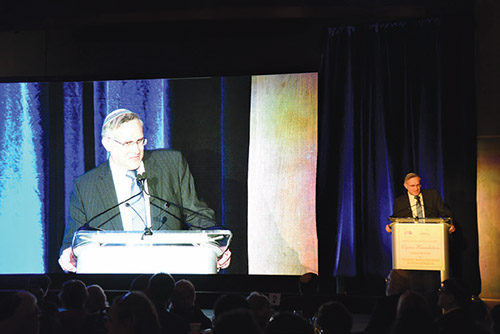



Preceding the Gala Dinner marking the jubilee of Yeshivat Har Etzion and the 20th anniversary of sister school Migdal Oz, on Sunday, April 7, at the Grand Hyatt Hotel, the community was invited to the Har Etzion Leadership and Education Conference. Addressing topics dealing with contemporary challenges impacting the Jewish community in Israel and the diaspora, today and in the future, the sessions featured faculty and alumni of the yeshiva and Migdal Oz who serve in communal leadership positions in Israel, the US and around the world.
The keynote discussion addressed the worldwide Dati Leumi community and the Har Etzion institutions—past, present and future. Panel participants included Harav Baruch Gigi, rosh yeshiva of Yeshivat Har Etzion and a 1975 graduate; Harav Moshe Lichtenstein, rosh yeshiva of Yeshivat Har Etzion, son of HaRav Aharon Lichtenstein, zt”l, founder of the yeshiva and a 1978 graduate; and Rabbanit Esti Rosenberg, daughter of Harav Aharon Lichtenstein, zt”l, founder of the yeshiva, who serves as the rosh beit midrash of the Stella K. Abraham Beit Midrash for Women of Yeshivat Har Etzion at Migdal Oz. The audience, a great many of whom were recent graduates of the Gush and Migdal Oz, appeared to be honored to be sitting in the presence of the Torah scholars and Jewish giants who had so greatly impacted their Torah learning and guided their choice of profession and Jewish community involvement.
The keynote discussion was introduced by Rabbi Seth Grauer, 1996 graduate of the yeshiva, currently rosh yeshiva and head of school of Bnei Akiva Schools of Toronto, and moderated by Rabbi Gideon Rothstein, 1982 graduate of the yeshiva, and author of “As If We Were There: Readings for a Transformative Passover Experience.”
Rav Gigi opened the session with a Hebrew presentation by making reference to the recent historic return of the holy remains of IDF soldier Zachary Baumel, graduate of Yeshivat Har Etzion, for an honorary Jewish burial on Har Herzl after 37 years of being missing in action. He prayed for the comfort of the family and for the hope of the families of the other IDF soldiers not yet brought back for proper Jewish burial. Rav Gigi went on to recount the many accomplishments of Yeshivat Har Etzion over the half-century since its founding, including its voluminous publications of hundreds of texts and online divrei Torah, its worldwide scholar-in-residence programs, its Tanach Yimei Iyun in Israel attracting thousands and its summer conferences and Darkeinu programs to name a few. Rav Gigi credited founding Rav Lichtenstein, zt”l, with setting the stage for the “shiluv,” combination of the Modern Orthodox world with the learning of Torah in “depth and seriousness” to become a model for many of the other contemporary Israeli yeshivot.
Rav Moshe Lichtenstein continued the conversation by noting that Israeli society has changed in the sense that other avenues of “avodat Hashem” have opened up, such as living in the settlements dotting the country. His firm message was that the three-pronged combination of serious Torah study, service in the IDF and “hityashvut” that the yeshiva espouses presents a true religious banner that Yeshivat Har Etzion is proud to raise aloft as a model to others. Rav Lichtenstein also stressed the need for placing tefillah at the center of the yeshiva experience. Just as a “bayit gadol,” a big house, refers to a “house in which we cultivate Torah,” it should at the same time be “a house that cultivates tefillah.”
Rabbanit Esti Rosenberg was warmly greeted by the many young “bogrot,” graduates, of one- or two-year programs at Migdal Oz. She attributed the almost 30-year movement of serious women’s learning to Rav Yosef Soloveitchik, zt”l, and then to her father, HaRav Aharon Lichtenstein, zt”l. She noted that as a result of their courage and encouragement, women from the ages of 18 to 30 are often engaged in serious Torah learning for up to seven years. Migdal Oz is a leader in this movement, which sends out the clear message of creating a true balance between Torah and Halacha. She noted that all three roshei yeshiva of Yeshivat Har Etzion are instructors at Migdal Oz.
When asked about her goals for the future of Migdal Oz, Rabbanit Rosenberg replied that she would like to increase the years that the young women learn there. In addition she would like to see them assuming leadership positions within the Jewish community when they return home, not only as teachers but as professional “balebustas” combining their in-depth Torah knowledge with their professional skills.
The six sessions preceding the final keynote discussion were led by prominent leaders and educators in well-regarded Jewish Torah institutions of learning throughout the U.S., some with close ties to the Teaneck community. Included on the list were Rabbi Dr. Gil Perl ’96, head of school, Kohelet Yeshiva, Philadelphia; Rav Yitzchak Etshalom ‘83, chairman, department of Bible, YULA High Schools; Rabbi Joe Wolfson ‘04, NYU director of JLIC; Yoetzet Halacha Shayna Goldberg, mashgicha ruchanit of the Bnot Chul, Migdal Oz; Yoetzet Halacha Shiffy Friedman MO ’06, assistant director student programming and educator at Ma’ayanot Yeshiva High School and OU JLIC educator at Columbia/ Barnard; and Yael Goldfischer, chair of Chumash and director of Israel guidance, Yeshivat Frisch. The sessions explored contemporary issues including increasing anti-Semitism threatening Jewish communities globally, teaching morally difficult sections of Tanach today, engaging post-millennials in a 2020 Jewish world and challenges and opportunities in academic Jewish studies.
The session grappling with the alarming increase in anti-Semitism globally was moderated by Rabbi Dr. Josh Joseph, senior vice president of Yeshiva University and a 1988 graduate of Yeshivat Har Etzion. Panelists included Moshe Bane, president of the OU and a 1977 graduate of the yeshiva, and Chief Rabbi Ephraim Mirvis, chief rabbi of the United Hebrew Congregations of the British Commonwealth and a 1976 graduate of Yeshivat Har Etzion.
By Pearl Markovitz










